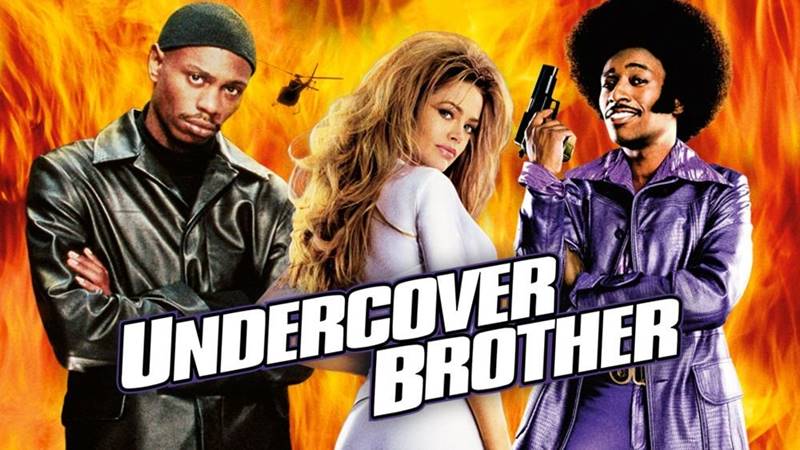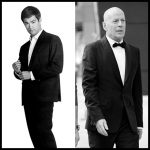
By Jae-Ha Kim
Chicago Sun-Times
May 31, 2002
2.5 out of 4 stars
The opening of “Undercover Brother” perfectly sets the tone for this comedy. Driving a vintage Cadillac, Undercover Brother has one hand on the steering wheel and the other holding a filled-to-the-rim drink. As the car executes a few 360-degree spins to avoid a car crash, our cool hero has a smile plastered on his face and not a hair of his retro ‘fro out of place. Not a drop of the soft drink spills on the car’s upholstery.
The scene is hysterical for its humor and memorable for its kitschy cool factor. Undercover Brother doesn’t realize how ridiculous he looks. And, even if he did, he’s too hip to care. Our hero is a master of disguise who prefers to work solo, but when the B.R.O.T.H.E.R.H.O.O.D–a CIA-like black organization that employs a white operative to meet affirmative action quotas–enlists him to figure out why a Colin Powell-type general would announce he’s starting a fried chicken franchise rather than run for the presidency, he can’t say no.
As Undercover Brother, Eddie Griffin is wonderful. He looks good enough to work the outrageously colorful outfits Undercover Brother favors, and he’s a hysterical mimic. During one battle, he pays homage to Bruce Lee’s pivotal fight scene in “Enter the Dragon” not only by voice, but by the crazed expression on his face when he’s going in for the kill. That his target is a bag of potato chips makes it even funnier.
Lee’s martial arts films aren’t the only inspiration for this movie. “Shaft” and other blaxploitation pictures starring Pam Grier and Jim Brown get a tip of the hat. But the dialogue is more “Airport” than “Cleopatra Jones.”
Undercover Brother and Sistah Girl (Aunjanue Ellis) are trapped on a golf course, security orders, “Do NOT move.” When they take off, the guards lament, “Oh hell, they moved.” Directed by Malcolm D. Lee, the film has the feel of a ’70s movie, but the definite verbal vibe of a 21st century creation.
While the movie can be crude at times, it’s never mean spirited. (OK, ripping the bad guy’s spine out–even as comic relief–can be construed as a little mean.) Yes, there are plenty of jokes at the white man’s expense. Before Undercover Brother is sent undercover as white-bread Anton Jackson, he is immersed in “Caucasiavision,” an intense round of everything from ‘N Sync to tractor pulls, to segments of “Riverdance.”
But the film liberally pokes fun at blacks as well. Conspiracy Brother (Dave Chappelle) blames the white man for taking credit for everything. And when the Denise Richards character, White She Devil, is introduced, it’s as “the black man’s Kryptonite.” Or, as Sistah Girl describes her, “Buffy, the black man slayer.”
Some moments grow old fast. Chris Kattan’s evil Mr. Feather is a rip-off of the “Austin Powers” villain, as well as his own “Saturday Night Live” character Mango. His best moment is during a fight with Undercover Brother a la Michael Jackson and company in the “Beat It” video.
The film ends as you would expect. But the spirit of the film is best characterized by this exchange between two operatives: “Behind every great black man is the police.”





